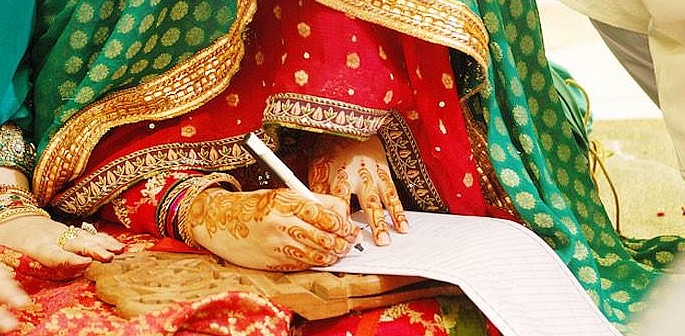"Our objection was to the use of the word 'Kumari'."
In a landmark verdict, a Bangladesh court has ordered the word ‘virgin’ to be removed from marriage certificates in the country.
The announcement was well-received after campaigners challenged the “humiliating and discriminatory” term.
Under Bangladesh’s Muslim marriage laws, a bride has to select one of three options on the certificate, whether she is a Kumari (virgin), widow or divorced.
The case was presented before the High Court in Bangladesh and on Sunday, August 25, 2019, the court quickly reached a verdict.
They ordered the government to remove the word ‘virgin’ and replace it with the word ‘unmarried’ to denote the marital status case of the bride.
The court also ordered the authorities to amend the form to include the terms ‘unmarried, widower or divorced’ for the groom.
Justice Naima Haider and Justice Khijir Ahmed Chowdhury passed the order, settling a rule on the amendment of the Nikahnama under section 9 of the Bangladesh Muslim Marriage & Divorce (Registration) Act, 1974.
Rights groups have criticised the term, which has been used since 1961, calling it “humiliating and discriminatory”, and saying that it breaches the privacy of the woman getting married.
Representing the groups was lawyer Aynun Nahar Siddiqua who said:
“Words like ‘Kumari’, ‘widow’ or ‘divorced’ have been used in the column No. 5 of Nikhanama to indicate the marital status of the bride.
“Our objection was to the use of the word ‘Kumari’.
“We had filed the petition challenging the word to protect the right to privacy.”
Siddiqua added: “The court has directed the authorities to replace the word as it is a matter of privacy. The mention of this word in Nikahnama creates discrimination.
“The court also called for the addition of another column, incorporating the options ‘unmarried, widower or divorced’ for the groom.”
The case was originally filed in 2014. The petition stated that the Nikahnama contained a column on the marital status of the bride but there was no column for the groom.
In the past, the Bangladesh court issued a rule after an initial hearing on the petition. They asked the government why column No. 5 of the Nikahnama should not be declared “discriminative” and “illegal”.
The court had also asked why the use of ‘Kumari’ should not be replaced or why a column should not be included in the form in relation to the groom.
After the verdict, Siddiqua said: “It’s a landmark verdict.”
The court is expected to publish its full verdict by October 2019. The changes to the certificate are expected to come into effect by then.






























































